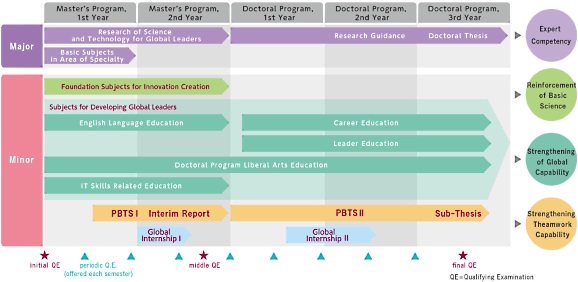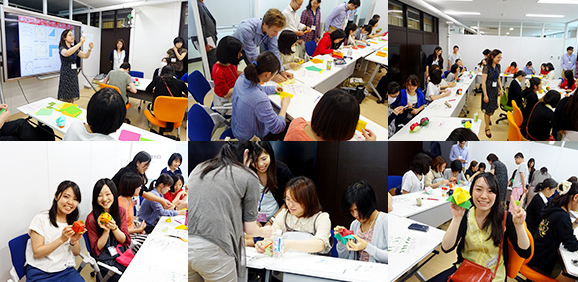Minor Course of Science and Technology for Global Leaders
What is the relationship between the Program for Leading Graduate Schools and this minor course?
In FY2013, Ochanomizu University’s program, “Fostering long-term creativity and innovation with science and technology disciplines based on Ochanomizu spirit ‘Migakazuba’ in the next generation of global leaders,” was selected for inclusion in the Program for Leading Graduate Schools.
Ochanomizu University established the Minor Course of Science and Technology for Global Leaders, in collaboration with the Division of Advanced Sciences and the Division of Life Sciences. The students in this minor course take classes that foster and develop their abilities in innovation and global leadership. Students learn how to manage the creative power of a team through project based team study. This is accomplished while the students master their specialties within their major courses.
For Reference:
Since FY2011, the Program for Leading Graduate Schools has been carried out by Japan’s Ministry of Education, Culture, Sports, Science and Technology (MEXT), for the purpose of making far-reaching reforms to graduate education in Japan, with the aim of fostering leaders who will play globally active roles in industry, academia, and government.
Who are the target students for this minor course?
To take this minor course as a degree program, you must take Advanced Sciences or Life Sciences as a master’s degree major course. Then, you need to be selected through an examination (initial-QE) for this minor course. Since this minor course is a five-year integrated master’s-doctoral program, it is expected that you will proceed to a doctoral course in Advanced Sciences or Life Sciences.
Can I take this minor course from the first year of a doctoral program?
Since this minor course is a five-year integrated master’s-doctoral program, you must take it from the beginning of your master’s program. Participation in this minor course only during the doctoral portion of your program is not allowed.
Admissions
When and how are selection examinations conducted?
Selection examinations are usually conducted after the announcement of admission results for master’s program, in February or March, and in September.
The examination includes document screening, interview, and a presentation of a PBTS(Project based team study) proposal.
How do I write a PBTS proposal for selection examination?
In PBTS (Project Based Team Study), students from different fields of specialization form a team, and work on forming a research proposal together. For admission to the minor program, you will need to write your own PBTS proposal, considering the following points:
-
Theme: Your theme will be based on social needs. Your team will set achievable targets, and you should consider how to approach those targets using the scientific methods of graduate research.
-
Schedule: You will formulate a schedule to achieve research results within the curriculum periods of PBTS I (master’s program) and PBTS II (doctoral program).
-
Members: Consider the contributions from team members in different fields of specialization (mathematics, physics, chemistry, biology, computer science, food nutrition, human environment) when you propose a project plan.
Sample proposals are available upon request.
Curriculum
Which classes do I need to take in this minor course?
To complete this minor course, students need to earn 37 or more total credits from the curriculum offered by the minor course during the master’s and doctoral programs.
The curriculum consists of Fundamental Courses in Innovation Creation, Global Leader Development Courses, PBTS (Project based team study), and a Laboratory Rotation (Global Internship).
In the master’s program, up to 10 credits earned in the minor course can be certified as credits in the major course.
Please refer to the “Curriculum” page of this website for more detailed information on curriculum.
How do I know the schedule of classes?
Compulsory classes are offered every year. Elective classes may change year to year.
The schedule of classes offered by this minor course will be presented on the “Lectures” page of this website.
Is the minor course curriculum available to non-minor course students?
Non-minor course students are also eligible to take classes offered by this minor course, except for Global Internship I, Global Internship II, PBTS I, and PBTS II.
Scholarship
What scholarship is provided for this minor course?
The Program for Leading Graduate Schools offers financial support for the students, in order to allow them to concentrate on their studies. For the students selected for this minor course, the scholarship is offered through the Program for Leading Graduate Schools. It will be awarded as follows.
For a student in master’s program: 170,000yen (planned) per month
For a student in doctoral program: 200,000yen (planned) per month
Notice:
Because this scholarship is considered taxable income, as “miscellaneous income” in accordance with the income tax law, you will need to file a tax return.
Who is eligible for the scholarship?
To receive a scholarship, students must take the Minor Course of Science and Technology for Global Leaders as a degree program. The recipients are determined by the Leading Graduate School Student Selection Committee in Ochanomizu University, according to their academic performance in the program. The application process will be required every year.
<Notes> Precautions for students receiving scholarship:
-
You must be a student within the standard academic term.
-
You should not receive other scholarships, including “Scholarship to International Students (Research Students)” supported by MEXT, or any scholarship from organizations or foundations in your home country, if you are an international student.
-
You should not earn money through outside work, including part-time jobs.
-
TA (Teaching Assistant) or RA (Research Assistant) activities inside the school may be allowed, if the total working hours are 5 hours per week, or less.
-
You may apply for competitive funding, such as JSPS DC, by completing a Request to Apply for Competitive Funding form.
Please refer to the “Guidelines for a Scholarship in the Program for Leading Graduate Schools at Ochanomizu University” for more detailed information.
How long does this scholarship last?
The scholarship support will cease in March, 2020.
PBTS
What is PBTS?
The core curriculum of this minor course is Project Based Team Study (PBTS), where students from various fields of specialization form teams and engage in research projects they create themselves. Students conduct all aspects of the research processes by themselves, including formulating research themes, and the management and development of their team’s research.
Each team will conduct weekly meetings with Study Commons teachers that they select. Each team will also appoint advisors from both inside and outside Ochanomizu University for additional support. Research projects may develop as joint research efforts with companies and research institutes. Financial support for research will also be provided.
How are PBTS activities evaluated?
In a periodic Qualifying Exam (pQE) held every half-year, students give presentations on their PBTS activities in English that is evaluated by program support personnel from inside and outside the university. Before finishing PBTS I, you will need to submit reports in English on your PBTS team’s performance, and your own performance within the team. To complete PBTS II, you will need to write a sub-thesis about your contribution to PBTS research in English, and submit it by the end of December (planned) in your final academic year for this course.
PBTS I and PBTS II take place over multiple years, and credits for PBTS curriculum are certified in the academic year in which they are completed.
Global Internship
What is a Global Internship?
A Global Internship (also called a Laboratory Rotation) entails performing PBTS-related research at other universities, research institutes, or companies. This curriculum is compulsory in both the master’s program and the doctoral program.
Global Internship I is taken in master’s program to give students research experience outside of the university.
Global Internship II is taken in doctoral program to promote PBTS research outside the university, and to develop leadership skills through learning to communicate in different research environments.
Duration of Internships
Global Internship I:
3-6 months in master’s program
Global Internship II:
6-12 months in doctoral program
Global Internship II may be divided into two segments.
How do I prepare for an internship?
You will consult with your supervisor in your major course and find an internship destination by yourself. The Leading Graduate School Promotion Center will help you negotiate with the candidate institution.
Where do students in this program perform internships?
Institutes where the students in this minor course have completed internships include:
Virginia Tech, University of Technology Sydney, University of Oxford, Strasbourg University, New York University, LPSC Grenoble (France), Shimane University, MEXT, Toray Industries, Inc., Fujitsu Limited, RIKEN, Weathernews Inc., TOKYO ENGINEERING CONSULTANTS Co., Ltd.
May I receive financial support for internship?
Internship expenses such as transportation and living expenses may be reimbursed. Since handling of financial support may change slightly, detailed information will be provided to students every year.
Evaluation System
What kind of evaluations are there?
There are four types of Qualifying Examination (QE).
-
An initial qualifying examination (iQE) will be taken at admission (document screening and interview).
-
A periodic qualifying examination (pQE) will be taken every half year (scheduled in September and March).
-
A middle qualifying examination (mQE) will be taken at the completion of master’s program.
-
A final qualifying examination (fQE) will be taken at the completion of doctoral program.
What are the qualifying examinations administered during this program?
-
A pQE evaluates the performance of PBTS activities. It includes an individual self-evaluation and a presentation by the PBTS team in English.
-
A mQE is an examination to advance to doctoral program in the minor course. It’s taken online in English. Students can choose from three out of five fields in mathematics, physics, computer science, chemistry, and biology. Two of them must be chosen from mathematics, physics, and computer science. In each field, students answer ten exam questions selected randomly among 100 questions disclosed in advance.
-
The fQE is to establish that the student has completed this minor course. You need to submit a sub-thesis about your contribution to PBTS research in English. You will also need to give a presentation of your contributions to PBTS, and the development of your abilities in global leadership.
Should I submit a master’s thesis?
In your major course, you don’t need to submit a master’s thesis. However, you will need to write an abstract of your research, and give an oral presentation at your master’s thesis presentation meeting. In the minor course, you need to submit an interim report of PBTS, and pass the middle QE at the end of master’s program.
Does this minor course require a doctoral thesis in addition to the major course?
To complete the Minor Course of Science and Technology for Global Leaders, you need to submit a sub-thesis for you PBTS contribution, while also submitting a doctoral thesis in your major course.
What degree will be awarded upon completion of the minor course?
At the completion of the minor course, you may be awarded a doctoral degree, such as, “Doctor (Science for Global Leaders),” depending on your field of specialty.
Other
Can I apply for a JSPS (Japan Society for the Promotion of Science) Research Fellowship for Young Scientists while I belong to this minor course?
Yes, you can. However, because it will conflict with the scholarship in the Program for Leading Graduate Schools, which is funded by MEXT, payment of minor program scholarship will be suspended. Other types of support will not be affected.




